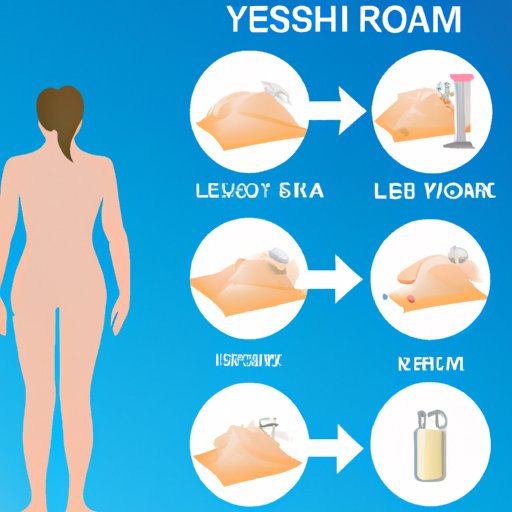Introduction
Loose skin is a common problem that occurs when you are losing weight. It is characterized by excess skin that has lost its elasticity due to rapid weight loss. This can be a frustrating and embarrassing problem for many people who are trying to lose weight and stay healthy. Fortunately, there are several steps you can take to reduce or even prevent loose skin during weight loss.
Increase Protein Intake
Protein is an important macronutrient that helps build and repair muscle tissue. Increasing your protein intake can help prevent loose skin during weight loss by helping to build and maintain muscle mass. This will help keep your skin tight and toned as you lose weight. Additionally, protein can also help boost your metabolism, which can help you burn more calories and fat.
Good sources of protein include lean meats, fish, eggs, dairy products, nuts, seeds, legumes, and plant-based proteins. Aim to get at least 20-30 grams of protein per meal. It’s also important to spread out your protein intake throughout the day to ensure your body is getting the necessary amounts.
Exercise Regularly
Regular exercise is essential for preventing loose skin during weight loss. Exercise helps to build and maintain muscle mass, which can help keep your skin tight and toned. Additionally, regular exercise can also help improve circulation and blood flow, which can help with skin health and elasticity.
Examples of exercises to build muscle include strength training, weight lifting, and bodyweight exercises such as push-ups, squats, and lunges. Aim for at least 30 minutes of exercise per day, five days a week.
Stay Hydrated
Hydration is key for keeping your skin healthy and preventing loose skin during weight loss. Water helps keep your skin hydrated and helps flush out toxins from your body. Additionally, water can also help improve digestion and absorption of nutrients, which can help with weight loss.
It’s recommended to drink at least eight 8-ounce glasses of water per day. You can also increase your water intake by eating water-rich foods such as cucumbers, celery, tomatoes, watermelon, and other fruits and vegetables.
Avoid Crash Dieting
Crash dieting is a term used to describe extreme diets that involve severely restricting calories or certain food groups. While these diets may seem effective in the short-term, they can be detrimental to your health in the long-term. Crash diets can lead to rapid weight loss, which can cause loose skin.
Instead of crash dieting, focus on making small, sustainable changes to your diet. This includes reducing your calorie intake, eating nutrient-dense foods, and avoiding processed and sugary foods. Additionally, it’s important to consult with a healthcare professional before beginning any diet or exercise program.
Get Enough Sleep
Getting enough sleep is essential for preventing loose skin during weight loss. Not only does sleep help reduce stress levels, but it also helps regulate hormones and boosts metabolism, which can help with weight loss. Additionally, sleep helps repair and regenerate skin cells, which can help improve skin health and elasticity.
It’s recommended to get at least seven to nine hours of sleep per night. Additionally, try to avoid using electronic devices before bed, as this can disrupt your sleep cycle.
Conclusion
Loose skin is a common problem that can occur when you are losing weight. Fortunately, there are several steps you can take to reduce or even prevent loose skin during weight loss. These tips include increasing protein intake, exercising regularly, staying hydrated, avoiding crash dieting, and getting enough sleep.
By following these tips, you can achieve your weight loss goals while maintaining healthy and toned skin. Remember to consult with a healthcare professional before beginning any diet or exercise program.


